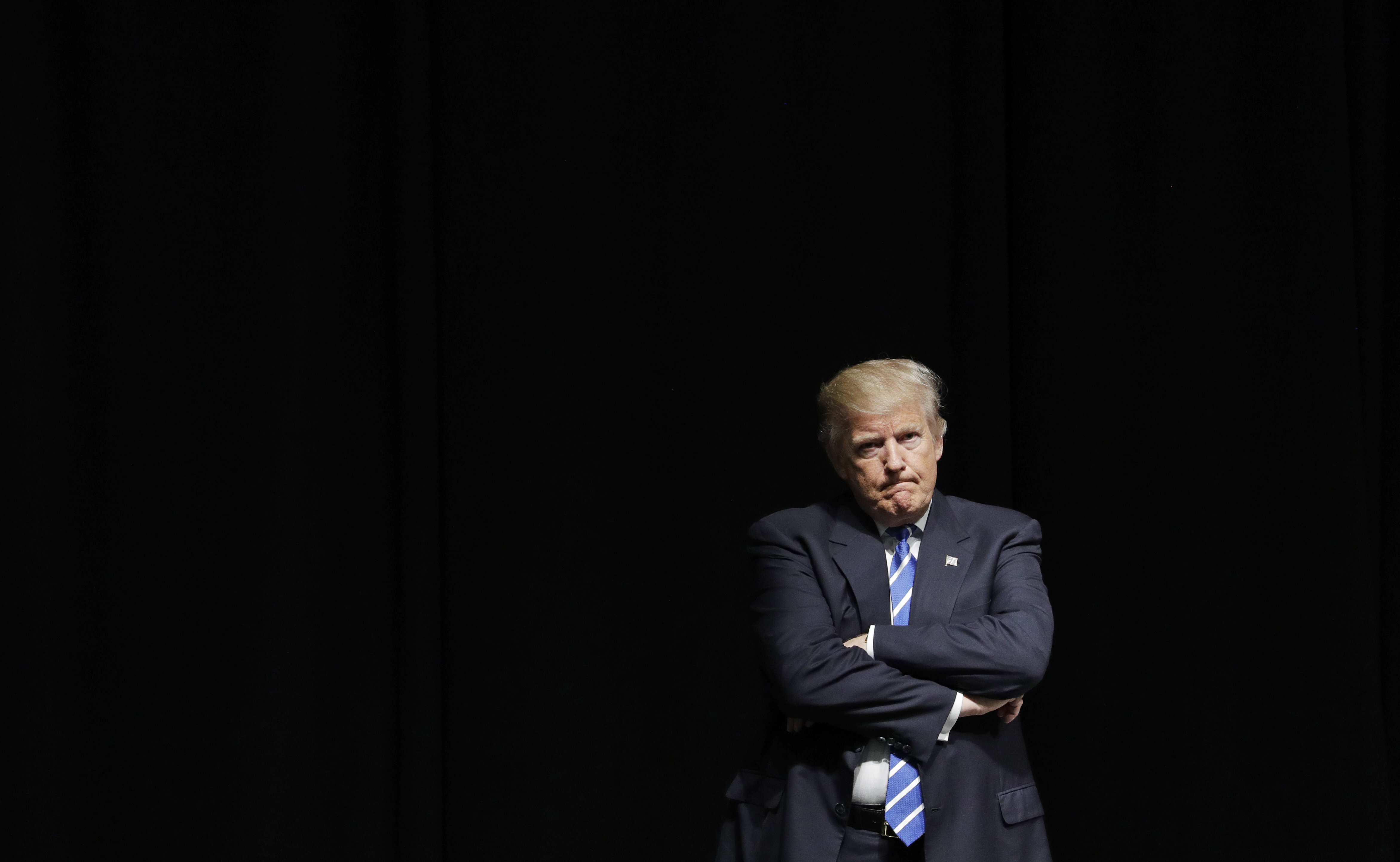Why Donald Trump will do even worse in the second debate
Can Trump win the next debate? Only if he becomes a completely different person.


Can Donald Trump become a better debater?
Many past presidential candidates have performed poorly in their first debate, figured out where and how they erred, and improved accordingly in the subsequent face-offs. In 2012, President Obama seemed unfocused and almost lethargic in his first debate with Mitt Romney, which aides put down to overconfidence and lack of preparation; he was much more engaged and aggressive in the next two. In 1984, Ronald Reagan seemed confused and almost incoherent at points in his first debate with Walter Mondale, raising questions about whether the 72-year-old president still had his wits about him; he came back in the next one and made a quip about the issue ("I will not make age an issue of this campaign. I am not going to exploit, for political purposes, my opponent's youth and inexperience"). Everyone laughed and pretended the whole thing never happened in the first debate.
Can Donald Trump bounce back in his next debate with Hillary Clinton, after she outperformed him so emphatically in their first meeting? It's going to be awfully tough for him. It isn't a matter of downing a triple espresso beforehand or coming up with a clever line or two. To change things in a meaningful way, he'd have to essentially stop being Donald Trump.
The Week
Escape your echo chamber. Get the facts behind the news, plus analysis from multiple perspectives.

Sign up for The Week's Free Newsletters
From our morning news briefing to a weekly Good News Newsletter, get the best of The Week delivered directly to your inbox.
From our morning news briefing to a weekly Good News Newsletter, get the best of The Week delivered directly to your inbox.
We heard before the first debate that Trump wasn't doing traditional rehearsals, which some suspected might have been just spin to lower expectations. It turns out now that it was even worse than that. An extraordinary article in The New York Times paints Trump's staff as something akin to earnest yet overwhelmed elementary school teachers trying to figure out how to contain and channel the behavior of a unruly child who hasn't taken his meds. They suggest he should practice, only to be rebuked. They bring in a podium for a mock debate, and see it go unused. In the end, it all falls apart:
There were early efforts to run a more standard form of general election debate-prep camp, led by Roger Ailes, the ousted Fox News chief, at Mr. Trump's golf course in Bedminster, New Jersey. But Mr. Trump found it hard to focus during those meetings, according to multiple people briefed on the process who requested anonymity to discuss internal deliberations. That left Mr. Ailes, who at the time was deeply distracted by his removal from Fox and the news media reports surrounding it, discussing his own problems as well as recounting political war stories, according to two people present for the sessions.Rudolph W. Giuliani, the former New York City mayor and a friend of Mr. Trump's who has been traveling with him extensively, took over much of the preparation efforts by the end. But with Mr. Trump receiving so much conflicting advice in those sessions, he absorbed little of it. [The New York Times]
Maybe now they'll succeed in getting Trump to do some practicing, but it's going to be a struggle; as we know, he has a notoriously short attention span. And if Rudy Giuliani is your main adviser on this, you've got a problem. Among other things, Giuliani is now offering the brilliant suggestion that Trump attack Clinton by noting that her husband cheated on her. Perhaps that's not surprising coming from Giuliani, who not only quite publicly cheated on his wife when he was mayor of New York but did everything he could to humiliate her in the process, in an episode of uncommon cruelty. Trump himself seems to like the idea; since Monday's debate he has suggested again and again to reporters that while he didn't bring up Monica Lewinsky then, he really wants to. That's going to go over great with women voters.
But on a more fundamental level, Trump will have to keep himself from acting on what we now understand are very powerful impulses. It isn't just about practicing more or having a few zingers ready. It's about who he is at his very core.
Clinton obviously understood that. She knew that just by attacking Trump, she could guide the discussion where she wanted it to go, since he is constitutionally incapable of letting any criticism pass without a counterattack. She also seemed to grasp that with the right kind of bait, she could get him to undermine himself. So she accused him of not paying taxes and he actually admitted it, saying, "That makes me smart." She said he stiffs his contractors, and he insisted that they must not have deserved to be paid. In other words, she knew that Trump absolutely must be seen by others as a shrewd businessman who gets the better of the people he deals with. What are the chances that wouldn't work if Clinton did it again, no matter how many times Trump's aides begged him not to take the bait? And you can bet she has some other stinging attacks all lined up.
A free daily email with the biggest news stories of the day – and the best features from TheWeek.com
There's another important factor that will make it hard for Trump to turn things around: The second debate will use the "town hall" format. Questions will be asked by ordinary citizens in the audience. These debates are different from others in a number of ways, none of which work to Trump's advantage.
First, we've seen in prior town hall debates that the questions tend to be more substantive, but less predictable. Unlike journalists who are intensely interested in the latest political controversy, citizens tend to use their one opportunity to ask the candidates about issues. But the issues they choose could be about anything from marijuana legalization to farm policy to the availability of mass transit options to who knows what. Trump does not exactly have a facility with a wide range of issues, making it likely that he'll display his ignorance and struggle to show he has any idea how to address the problems people have.
Second, the presence of those citizens means that viewers will be watching to see how the candidates relate to them, and relating to other humans one-on-one is something Hillary Clinton is actually very good at — which we forget when we think about her limitations as a public performer. To a great extent, this is the most natural place for her, where she can talk about the substance of issues but also connect with people one at a time.
Now try to imagine Donald Trump looking into a voter's eyes and answering a complicated, demanding question from them. Does anyone think that's something he's going to do well at? Probably not, which is why it's possible that the second debate will turn out even worse for him than the first. Even if he finds some time to practice.
Paul Waldman is a senior writer with The American Prospect magazine and a blogger for The Washington Post. His writing has appeared in dozens of newspapers, magazines, and web sites, and he is the author or co-author of four books on media and politics.
-
 Must-see bookshops around the UK
Must-see bookshops around the UKThe Week Recommends Lose yourself in beautiful surroundings, whiling away the hours looking for a good book
-
 A Nipah virus outbreak in India has brought back Covid-era surveillance
A Nipah virus outbreak in India has brought back Covid-era surveillanceUnder the radar The disease can spread through animals and humans
-
 Nasa’s new dark matter map
Nasa’s new dark matter mapUnder the Radar High-resolution images may help scientists understand the ‘gravitational scaffolding into which everything else falls and is built into galaxies’
-
 The billionaires’ wealth tax: a catastrophe for California?
The billionaires’ wealth tax: a catastrophe for California?Talking Point Peter Thiel and Larry Page preparing to change state residency
-
 Bari Weiss’ ‘60 Minutes’ scandal is about more than one report
Bari Weiss’ ‘60 Minutes’ scandal is about more than one reportIN THE SPOTLIGHT By blocking an approved segment on a controversial prison holding US deportees in El Salvador, the editor-in-chief of CBS News has become the main story
-
 Has Zohran Mamdani shown the Democrats how to win again?
Has Zohran Mamdani shown the Democrats how to win again?Today’s Big Question New York City mayoral election touted as victory for left-wing populists but moderate centrist wins elsewhere present more complex path for Democratic Party
-
 Millions turn out for anti-Trump ‘No Kings’ rallies
Millions turn out for anti-Trump ‘No Kings’ ralliesSpeed Read An estimated 7 million people participated, 2 million more than at the first ‘No Kings’ protest in June
-
 Ghislaine Maxwell: angling for a Trump pardon
Ghislaine Maxwell: angling for a Trump pardonTalking Point Convicted sex trafficker's testimony could shed new light on president's links to Jeffrey Epstein
-
 The last words and final moments of 40 presidents
The last words and final moments of 40 presidentsThe Explainer Some are eloquent quotes worthy of the holders of the highest office in the nation, and others... aren't
-
 The JFK files: the truth at last?
The JFK files: the truth at last?In The Spotlight More than 64,000 previously classified documents relating the 1963 assassination of John F. Kennedy have been released by the Trump administration
-
 'Seriously, not literally': how should the world take Donald Trump?
'Seriously, not literally': how should the world take Donald Trump?Today's big question White House rhetoric and reality look likely to become increasingly blurred
